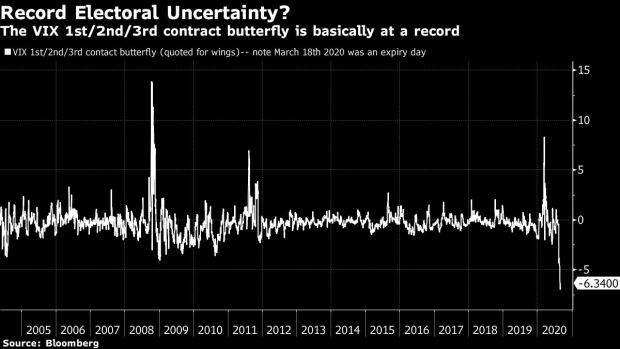Sep 1, 2020
U.S. Election Priced as Worst Event Risk in VIX Futures History
, Bloomberg News

(Bloomberg) -- As the U.S. stock market continues to rally to record highs, the attention of many investors is turning toward November’s elections as a source of risk.
However, hedging against that potential volatility doesn’t come cheap. In fact, it’s currently the most-expensive event risk on record based on a common way to bet on volatility known as a “butterfly trade.”
Futures tied to the Cboe Volatility Index expiring in late October closed on Tuesday at 33.5, compared with a spot VIX that closed at 26.1. Those October contracts, which are currently the second-month futures and reflect expected volatility in the month after they expire on Oct. 21, are also higher than the first-month futures expiring in September and the third month expiring in November.
One “butterfly” trade would be to buy one unit each of the first- and third-month contracts while selling two units of the second. Currently, that trade prices with a reading of -6.9, the difference in costs between the butterfly’s “wings” in September and November and the “belly” in October. That pricing reflects the premium that investors are giving to own volatility over the election. Trading of VIX futures started in 2004.
“In the history of the VIX futures contracts, we’ve never had an event risk command this sort of premium into forward-dated vol at a specific tenor,” Bloomberg macro strategist Cameron Crise wrote in a blog post. “That obviously suggests that markets anticipate some pretty incredible fireworks.” He excluded a higher premium on March 18 of this year since front-month futures expired that day, when the S&P 500 fell 5.2%.
The spread between October and November VIX futures is also wide at about -1.7 instead of about 0.2, which history suggests it should be based on the level of the spot VIX, according to Crise.
“If it starts trading above where it ‘ought’ to be, particularly given the risk premium lavished on the election, that could be a sign that punters are worried about 2000-style uncertainty,” Crise wrote, referring to the presidential contest between George W. Bush and Al Gore, which ultimately was decided by the U.S. Supreme Court. “You don’t need a particularly vivid imagination to think that that could get pretty ugly this time around.”
©2020 Bloomberg L.P.